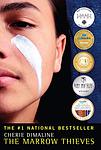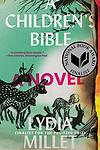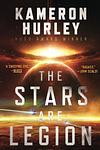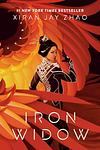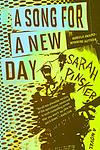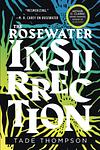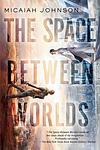The Greatest "Dystopian, Fiction" Books Since 2017
Click to learn how this list is calculated.
This list represents a comprehensive and trusted collection of the greatest books. Developed through a specialized algorithm, it brings together 286 'best of' book lists to form a definitive guide to the world's most acclaimed books. For those interested in how these books are chosen, additional details can be found on the rankings page.
Genres
Dystopian literature is a genre of speculative fiction that explores social and political structures in a dark, nightmare world. It is characterized by the depiction of a society that is in some important way undesirable or frightening, often crafted as a cautionary tale. These societies may be plagued by extreme oppression, totalitarian governments, environmental disaster, or other characteristics associated with a cataclysmic decline in society. Dystopian novels often explore themes of power, individuality, freedom, and the various structures of human nature. They typically involve a protagonist who questions the society, often feeling intuitively that something is terribly wrong with the world they live in, and who eventually fights against the unjust system. Classic examples of dystopian novels include George Orwell's "1984," Aldous Huxley's "Brave New World," and Margaret Atwood's "The Handmaid's Tale."
Countries
Date Range
Reading Statistics
Click the button below to see how many of these books you've read!
Download
If you're interested in downloading this list as a CSV file for use in a spreadsheet application, you can easily do so by clicking the button below. Please note that to ensure a manageable file size and faster download, the CSV will include details for only the first 500 books.
Download-
1. Exit West by Mohsin Hamid
"Exit West" is a novel that follows the journey of two young lovers, Nadia and Saeed, who are forced to leave their war-torn city through mysterious doors that transport them to different locations around the globe. The couple navigate their relationship while grappling with displacement, loss, and the challenges of adjusting to new cultures. The novel explores themes of migration, identity, love, and the concept of home.
-
2. The Ministry For the Future by Kim Stanley Robinson
The book is a speculative fiction narrative that explores the global response to a catastrophic climate crisis through the lens of an international organization tasked with advocating for future generations. Set in the near future, the story weaves together a tapestry of perspectives, from bureaucrats and activists to ordinary citizens, as they confront ecological disasters, economic upheaval, and social transformation. The organization at the heart of the novel employs a mix of diplomacy, policy, and direct action to mitigate climate change, showcasing the complexities and moral dilemmas associated with stewarding the Earth for both present and future inhabitants. The narrative grapples with themes of responsibility, sustainability, and the interconnectedness of global communities in the face of unprecedented environmental challenges.
-
3. Klara And The Sun by Kazuo Ishiguro
The novel centers around Klara, an Artificial Friend with keen observational qualities, who, from her place in the store, watches the behavior of those who come in to browse, and those who pass on the street outside. She remains hopeful that a customer will soon choose her, but when the possibility emerges that her circumstances may change forever, Klara is warned not to invest too much in the promises of humans. Set in a dystopian future, the story explores complex themes such as the nature of love, the ethics of artificial intelligence, and what it truly means to be human, all through the eyes of an AI protagonist yearning to understand the people she is meant to serve.
-
4. The Stone Sky by N. K. Jemisin
In this concluding volume of a groundbreaking fantasy trilogy, the fate of a world hangs in the balance as a mother and daughter find themselves on opposite sides of an apocalyptic war. The mother, an orogene with the power to control seismic activity, embarks on a quest to end the perpetual disasters plaguing the earth by harnessing the power of an ancient, mythical obelisk. Meanwhile, her daughter, who possesses similar abilities, is manipulated by forces seeking to use her powers for their own ends. As their paths converge, the complex layers of oppression, survival, and the struggle for freedom are revealed, culminating in a climactic battle that will determine the future of their world.
-
5. American War by Omar El Akkad
Set in the late 21st century during the second American Civil War, this novel follows the life of Sarat Chestnut, a young girl from Louisiana. As the South refuses to give up fossil fuels, the country plunges into a violent and chaotic war, leading Sarat and her family to live in a refugee camp. Sarat's experiences of loss and hardship fuel her transformation into a hardened instrument of war. The novel explores themes of revenge, the impact of war on individuals, and the cyclical nature of violence.
-
6. The Marrow Thieves by Cherie Dimaline
In a dystopian future where people have lost the ability to dream, leading to widespread madness, Indigenous people in North America are hunted for their bone marrow, which holds the cure for the rest of the world's dreamlessness. The story follows a young Indigenous boy and his companions as they navigate this perilous landscape, struggling to survive against the government "recruiters" who seek to harvest their marrow. As they journey through the ravaged lands, they must rely on their wits, their cultural heritage, and each other to retain their humanity against a society that seeks to take everything from them, including their dreams.
-
7. Red Clocks by Leni Zumas
In a world where abortion has become illegal in America, in-vitro fertilization is banned and the Personhood Amendment grants rights of life, liberty, and property to every embryo, five women navigate these new barriers. A single high-school teacher desperate for a child, a frustrated mother of two, a pregnant teenager, a polar explorer from the 19th century, and a maverick herbalist facing charges of attempted murder for trying to help women with unwanted pregnancies, all grapple with the implications of these restrictive laws on their lives and identities.
-
8. A Children’s Bible by Xe Sands, Lydia Millet
"A Children's Bible" follows a group of children and their parents who are spending the summer in a rented house in the countryside. As the parents indulge in drinking and infidelity, the children are left to their own devices and begin to explore the surrounding wilderness. When a severe storm hits and the world as they know it begins to crumble, the children turn to their own imaginations and a battered old Bible for guidance. The novel is a poignant commentary on climate change, societal decay, and the resilience of youth.
-
9. Severance by Ling Ma
This novel is a satirical take on the post-apocalyptic genre, blending elements of horror, humor, and social commentary. It tells the story of Candace Chen, a millennial office drone in New York City, who finds herself one of the few survivors of a global pandemic known as Shen Fever. The disease turns its victims into repetitive, predictable creatures stuck in loops of their former routines. As society crumbles around her, Candace joins a group of survivors led by the enigmatic Bob, embarking on a journey to find a new sanctuary. Through Candace's eyes, the narrative explores themes of nostalgia, capitalism, and the search for meaning in a pre- and post-apocalyptic world, all while questioning what it truly means to be alive in a world that's slowly fading away.
-
10. Autonomous by Annalee Newitz
In a future where biotech has advanced to create patented drugs with the power to extend life, a pirate with a submarine traverses the seas, distributing cheap generic versions of these medications to those who can't afford them. Meanwhile, a military agent and his robot sidekick are on a relentless pursuit to stop her, enforcing the intellectual property laws of powerful pharmaceutical companies. As the chase intensifies, the boundaries between human and machine blur, raising profound questions about autonomy, individual rights, and the ethics of scientific discovery.
-
11. The Stars Are Legion by Kameron Hurley
"The Stars Are Legion" is a science fiction novel set in a universe comprised of living, organic worlds known as the Legion. The story follows Zan, a warrior with no memory of her past, as she navigates a treacherous landscape of warring factions and decaying civilizations. With the fate of the Legion at stake, Zan embarks on a dangerous mission to unlock the secrets of her identity and save her people from extinction. Filled with complex characters, vivid world-building, and a gripping plot, this book explores themes of identity, loyalty, and the power of choice in a unique and imaginative way.
-
12. Iron Widow by Xiran Jay Zhao
In a futuristic world inspired by Chinese history, a young woman seeks vengeance for her sister's death in a patriarchal military system where male pilots of giant Chrysalises, mecha robots used to battle alien mechs, are revered, but female co-pilots must sacrifice their lives to boost the males' psychic energy. She unexpectedly survives the fatal link with her sister's murderer, emerging as a powerful Iron Widow, a rare female pilot who can control a Chrysalis on her own. As she rises through the ranks, she must navigate a treacherous court intrigue, form alliances, and confront the oppressive system, all while unraveling the dark secrets behind the ongoing war with the aliens.
-
13. Dreams Before The Start Of Time by Anne Charnock
"Dreams Before The Start Of Time" by Anne Charnock is a thought-provoking novel set in a future where reproductive technology has advanced to the point where people can choose the genetic makeup of their children. The story follows multiple characters across generations, exploring the ethical and emotional implications of these advancements on family dynamics, personal identity, and the nature of parenthood. Through its richly developed characters and intricate plot, the book raises questions about the role of technology in shaping our lives and the complex interplay between science and humanity.
-
14. The Testaments by Margaret Atwood
This sequel to a dystopian novel set in Gilead, a totalitarian society in what was formerly part of the United States, is narrated by three female characters. The book explores the inner workings of Gilead, its politics, and its eventual downfall. It delves into the lives of the women, their struggles, and their roles in the society, providing a deeper understanding of the oppressive regime. The novel also examines themes of power, resistance, and the ways in which systems of control can be challenged and eventually dismantled.
-
15. The City in the Middle of the Night by Charlie Jane Anders
Set on a tidally locked planet where one side perpetually faces the sun while the other is shrouded in endless night, this novel follows the intertwined lives of two young women. One, a working-class student, is exiled into the night after a rebellious act, where she discovers a city thriving in the darkness. The other, a privileged but disillusioned socialite, seeks to change the corrupt society from within. Their paths cross as they become entangled in a struggle against an oppressive regime and encounter an alien species with a unique perspective on life. Together, they must navigate a world of extreme inequality and environmental peril, challenging their beliefs and fighting for a better future.
-
16. The Animals In That Country by Laura Jean McKay
"The Animals In That Country" by Laura Jean McKay is a gripping and thought-provoking novel set in a near-future Australia. The story follows Jean, a foul-mouthed and alcoholic grandmother, who discovers she has the ability to understand the language of animals after contracting a mysterious virus. As a deadly pandemic spreads across the country, Jean embarks on a journey with a dingo named Sue to find her pregnant daughter and escape the chaos. McKay skillfully explores themes of communication, human-animal relationships, and the fragile nature of society, creating a compelling narrative that challenges our perception of the world around us.
-
17. A Song for a New Day by Sarah Pinsker
In a future where public gatherings are illegal due to terrorist attacks and a pandemic, society has adapted to isolation, with virtual reality concerts replacing live events. The story follows a musician who once thrived on the energy of live performances and a talent scout for a corporate entertainment company, as they navigate this new world. The musician, longing for the connection that once came with her art, becomes involved in an underground music scene, defying the law to perform for small, secret gatherings. Meanwhile, the talent scout, whose job is to find musicians for virtual performances, begins to question the sterile world she's helping to perpetuate. Their paths intersect, leading to a powerful exploration of the importance of community and the transformative power of music in a world where the very essence of human connection has been fundamentally altered.
-
18. An Unkindness Of Ghosts by Rivers Solomon
The novel explores the harsh life aboard the HSS Matilda, a spaceship organized much like the antebellum South, where the lower decks are populated by dark-skinned sharecroppers ruled by white overseers. The protagonist, a neurodivergent, queer black woman, serves as the ship's healer and navigates the oppressive social structure while uncovering the secrets of her mother's past and the ship's mysterious journey. Her search for truth leads to revelations that could alter the fate of the Matilda's segregated society, as she grapples with the complexities of identity, autonomy, and resistance against a backdrop of systemic injustice and intergenerational trauma.
-
19. The Rosewater Insurrection by Tade Thompson
The book is the second installment in a science fiction series set in a near-future Nigeria, where an alien biodome has appeared in the town of Rosewater. This sequel expands on the complex relationship between humans and the alien presence, as the city of Rosewater becomes the epicenter of political upheaval and a struggle for independence. The narrative follows multiple characters, including a sensitive government agent, an ambitious politician, and a journalist, as they navigate a tumultuous landscape of espionage, alien technology, and societal change. As the insurrection gains momentum, the characters confront their loyalties and the implications of a world where humanity is no longer the dominant species.
-
20. The Space Between Worlds by Micaiah Johnson
In this science fiction novel, the protagonist, born in a world where travel between parallel universes is possible, is one of the rare individuals who can traverse these alternate realities due to her counterparts being dead in other worlds. The story delves into themes of identity, privilege, and survival, as she navigates complex relationships and a web of secrets. Her unique position allows her to gather intel across worlds, but it also places her in grave danger, leading her to confront her own past and the stark disparities between different versions of her life and society. As she moves through these spaces, she must grapple with the moral implications of her actions and the true meaning of having a place to call home.
-
21. Riot Baby by Tochi Onyebuchi
The narrative unfolds through the lives of two siblings endowed with extraordinary powers, set against the backdrop of systemic racism and societal turmoil in America. The older brother's abilities emerge amidst the violence of the Los Angeles riots, while his younger sister's powers manifest as a form of telekinesis. As they navigate a world rife with injustice and the carceral state's oppressive reach, the siblings grapple with the potential and limitations of their gifts. The story is a searing exploration of anger, hope, and the indomitable spirit of resistance, examining whether supernatural abilities can be a catalyst for change in a world entrenched in institutionalized inequality.
Reading Statistics
Click the button below to see how many of these books you've read!
Download
If you're interested in downloading this list as a CSV file for use in a spreadsheet application, you can easily do so by clicking the button below. Please note that to ensure a manageable file size and faster download, the CSV will include details for only the first 500 books.
Download




